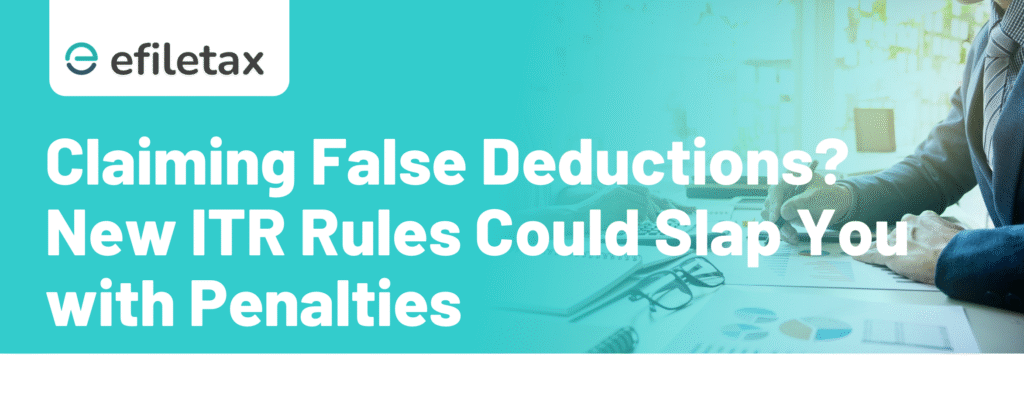
Summary
The Income Tax Department has tightened compliance with new ITR rules. Taxpayers claiming false deductions or filing incorrect returns may face penalties under Section 270A or prosecution under Section 276C. Here’s what you must know to file accurate returns and avoid legal trouble.
New ITR Rules: Penalty for False Deductions and Incorrect Returns
From AY 2025–26, the Income Tax Department has stepped up efforts to penalise false deductions and incorrect ITRs. With AI-assisted scrutiny and data matching across PAN, Form 26AS, AIS, and TIS, errors or deliberate misinformation can now trigger hefty penalties or even prosecution.
Let’s break down what’s new, what the law says, and how to stay compliant.
What Are the New ITR Rules for AY 2025–26?
As per CBDT Notification No. 40/2025 dated 29.04.2025, revised ITR forms (ITR-1 to ITR-5) have introduced enhanced disclosures to verify claims and catch false deductions.
Key updates include:
- Mandatory Schedule DI validation: Cross-verification of deduction claims under Chapter VI-A.
- Income from other sources: Additional fields for dividend, lottery winnings, and interest income.
- Capital gains: Reporting with enhanced granularity, matching AIS/Form 26AS.
- Tax regime selection: Section 115BAC declarations required in the ITR itself.
Penalties for Incorrect ITRs and False Deductions
1. Section 270A – Penalty for Under-reporting or Misreporting Income
- Under-reporting: Penalty = 50% of tax payable on the under-reported income.
- Misreporting (e.g., claiming false deductions): Penalty = 200% of tax payable.
Examples of Misreporting:
- Falsely claiming HRA without rent receipts.
- Declaring fake 80C investments.
- Omitting interest from FDs or savings accounts.
2. Section 276C – Prosecution for Wilful Tax Evasion
If the act is proved to be wilful, it may attract prosecution:
- Imprisonment: 3 months to 7 years
- Fine: As determined by the court
➡️ Prosecution is generally invoked for serious or repeated offences.
How Does the Income Tax Department Detect Errors?
With real-time data tracking through:
- Form 26AS and Annual Information Statement (AIS)
- PAN-Aadhaar linking
- TDS reconciliation and reporting from banks/employers
- High-value transactions flagged via SFT (e.g., cash deposits, luxury spends)
Mismatch = Scrutiny = Penalty
Expert Tip: How to Stay Safe While Filing ITR
“Always cross-check your deductions with Form 26AS and AIS before claiming. Use valid proofs and retain documents for 6 years.”
— CA Nitesh Aggarwal, Efiletax Panel Expert
Step-by-Step Guide to Avoid Penalties
- Reconcile income with Form 26AS, AIS, and TIS.
- Avoid inflated deduction claims without documentary evidence.
- Use correct ITR form based on income type.
- Declare all sources of income, including freelance/gig work.
- Disclose exempt income (e.g., PPF interest, agriculture).
- Select correct tax regime (Old vs New) and file accordingly.
Legal References
- Section 270A – Penalty for underreporting/misreporting income
- Section 276C – Wilful attempt to evade tax
- CBDT Notification No. 40/2025 – ITR Form Updates
Frequently Asked Questions (FAQs)
Q1. Can I revise my ITR if I made a mistake?
Yes. Under Section 139(5), you can revise your return before 31st December of the assessment year or completion of assessment, whichever is earlier.
Q2. What if I accidentally forgot some income?
If it’s genuine, revise your ITR immediately. Penalty may be waived for voluntary correction.
Q3. What if my deduction proof is unavailable?
Claim only what can be substantiated with valid receipts, investment proofs, or employer certificates.
Final Thoughts
Filing an accurate and truthful ITR is now more important than ever. With increasing automation and scrutiny, false deductions or incorrect reporting could cost you heavily in terms of penalties or prosecution.